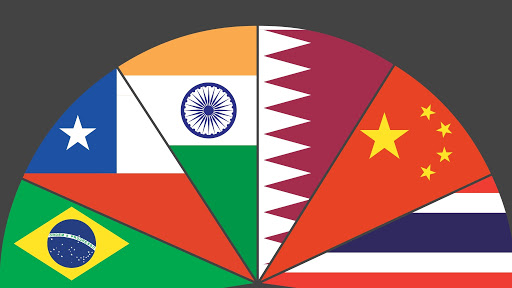So while experts pursuing emerging-markets investment strategies insist they present a buying opportunity,
所以雖然追求新興市場投資策略的專家堅稱,他們提供了一個買入機會,
to commonsense civilians and other skeptics, they look and feel like a trap. Who's right?
但對普通民眾和其他持懷疑態度的人來說,它們看起來且感覺上都像是一個陷阱。誰是對的?
For the sake of prudence, let's start with the considerable risks.
為了謹慎起見,讓我們先從重要風險說起。
These involve understanding this year's big selloff and acknowledging that by betting on the likes of China, Mexico, and India,
其中涉及了解今年的大拋售,以及承認通過押注中國、墨西哥和印度,
investors are embarking on a potentially lucrative but almost certainly bumpy ride. Two principal factors triggered this year's drop:
投資者開始了一段可能有利可圖但幾乎肯定崎嶇不平的旅程。兩個主要因素觸發了今年的下跌:
shock waves from moves by the Federal Reserve Bank that raised interest rates in the U.S.
美聯儲提高利率的沖擊
and the rise in global trade tensions stoked by the Trump administration. Those factors, in turn, triggered a slowdown in emerging-market growth rates.
以及特朗普政府激起的全球貿易緊張局勢。這些因素反過來觸發了新興市場增長率的減速。
What ensued was fear of a meltdown that could mirror the Asian debt crisis of 1997.
隨之而來的是對經濟崩潰的擔憂,這可能與1997年的亞洲債務危機如出一轍。
A funding crisis occurs when companies borrow heavily in dollars,
當公司大量借入美元,
and investors lose confidence in the ability of national governments or leading corporations to cover the interest payments.
并且投資方對國家政府或龍頭企業償還利息的能力失去信心時,就會發生資金危機。

The lenders then refuse to refinance the debt, leading to a wave of bankruptcies. That's what happened in the late 1990s.
貸方隨后拒絕為債務再融資,導致了一波破產浪潮。這就是20世紀90年代末發生的事情。
"People read these headlines about countries with big currency problems, and given the disaster of 20 years ago, they get really scared," says GMO's John Thorndike.
“人們讀到了關于國家遭遇巨大貨幣問題的新聞,鑒于20年前的災難,他們真的害怕了,”GMO的John Thorndike表示。
Investors can be forgiven their concern, considering that funding crises have already hit Argentina and Turkey.
考慮到資金危機已經重創阿根廷和土耳其,投資方的擔憂可以被原諒。
The Fed's rate hikes caused the U.S. dollar to spike relative to currencies in the developing world.
美聯儲加息導致美元兌發展中國家貨幣匯率飆升。
Many of those countries have underdeveloped capital markets, so their governments and companies borrow from abroad, frequently in dollars.
其中很多國家的資本市場都不發達,所以其政府和公司從國外借款,通常是美元。
As the greenback appreciates, they're forced to pay a lot more in Indonesian rupiah or Argentine pesos,
隨著美元增值,他們被迫支付更多的印度尼西亞盾或阿根廷比索,
for example, to meet their dollar-denominated interest payments.
以支付以美元計價的利息。
Central banks then lift their own rates to prevent their currencies from sliding even more, a move that slows their economies,
隨后央行抬高本行利率,以防止本國貨幣進一步貶值,此舉減緩了他們的經濟,
further curbing the business and tax revenues needed to repay foreign lenders.
進一步抑制了需要償還外國銀行的商業和稅收收入。
Since late 2017, Mexico, South Korea, Russia, Indonesia, and Turkey have all raised rates, with Turkey going this year from 8% to 24%.
自2017年底以來,韓國、俄羅斯、印尼和土耳其都提高了利率,其中土耳其今年將利率從8%提高到24%。
That vicious circle may cause a downgrade in their credit, so as principal payments on their debt come due,
這種惡性循環可能會導致它們的信用降級,因此當它們的債務本金到期時,
overseas banks demand double-digit rates to refinance their loans. The possible upshot: a replay of the defaults and devaluations of 20 years ago.
海外銀行會要求兩位數的利率來對它們的貸款進行再融資。可能的結果:20年前的違約和貶值重演。
The other peril is volatility. Emerging-market equities flourished in the run-up of global commodities prices
另一個危險是波動性。在本世紀頭十年的大部分時間里,新興市場股票在全球商品價格的急劇增長中繁榮,
for most of the 2000s as many involve resource-rich countries and net exporters.
因為其中許多股票都涉及資源豐富的國家和凈出口國。
But then pricey currencies and falling prices for oil and other raw materials sent the sector into a five-year bear market.
但昂貴的貨幣和石油及其他原材料價格下跌將,讓該行業進入了為期五年的熊市。
譯文由可可原創,僅供學習交流使用,未經許可請勿轉載。













